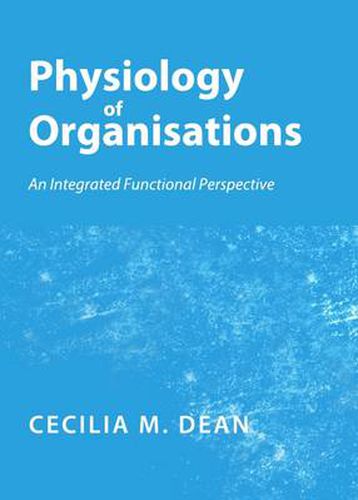Readings Newsletter
Become a Readings Member to make your shopping experience even easier.
Sign in or sign up for free!
You’re not far away from qualifying for FREE standard shipping within Australia
You’ve qualified for FREE standard shipping within Australia
The cart is loading…






Can we imagine organisations to be like human bodies? Modern medicine has advanced since the study of blood, phlegm, yellow bile and black bile was assumed to explain how the body functions. Organisational science today is in a similar mediaeval position, with fragmented theories of structure, competitiveness and human resources, and no overall theory of organising. This book fills that gap by constructing a physiological theory of organising.During the middle of the twentieth century, the anthropologist Radcliffe-Brown asserted that there should be a single branch of science for the study of human society. He maintained that a natural science, in the form of the study of the physiology of societies, was not yet available to form a link between theory and applied science. This research-based book explores the feasibility of studying the physiology of organisations, and determines whether this sort of knowledge can offer an improved perspective on organisational functioning. If we think about organisations in the same way that we think about human bodies, then we will be able to treat them when they are ill, and ensure that they work at maximum efficiency.
$9.00 standard shipping within Australia
FREE standard shipping within Australia for orders over $100.00
Express & International shipping calculated at checkout
Can we imagine organisations to be like human bodies? Modern medicine has advanced since the study of blood, phlegm, yellow bile and black bile was assumed to explain how the body functions. Organisational science today is in a similar mediaeval position, with fragmented theories of structure, competitiveness and human resources, and no overall theory of organising. This book fills that gap by constructing a physiological theory of organising.During the middle of the twentieth century, the anthropologist Radcliffe-Brown asserted that there should be a single branch of science for the study of human society. He maintained that a natural science, in the form of the study of the physiology of societies, was not yet available to form a link between theory and applied science. This research-based book explores the feasibility of studying the physiology of organisations, and determines whether this sort of knowledge can offer an improved perspective on organisational functioning. If we think about organisations in the same way that we think about human bodies, then we will be able to treat them when they are ill, and ensure that they work at maximum efficiency.